The Maid of Maiden Lane - 1900
Amelia E. Barr
203 pages
genre - Historical, Romance
my rating - 3 out of 5 stars
According to www.thefreedictionary.com, verbose means: using or containing an excessive number of words; wordy. While I was on the website I also looked up grandiose, which means: characterized by feigned or affected grandeur; pompous.
Both excellent words I would use to describe the writing in The Maid of Maiden Lane. Perhaps the author was trying to replicate a much earlier time in American history and the speech used during that time.
Here is part of the opening paragraph: "Never, in all its history, was the proud and opulent city of New York more glad and gay than in the bright spring days of Seventeen-Hundred-and Nighty-One (1791). It had put out of sight every trace of British rule and occupancy, all its homes had been restored and re-furnished, and its sacred places re-consecrated and adorned."
Soon we are introduced to a young lady, Miss Cornelia Moran. "She might have stepped out of the folded leaves of a rosebud, so lovely was her face, framed in its dark curls...She was small, but exquisitely formed, and she walked with fearlessness and distinction. Yet there was around her an angelic gravity..."
Cornelia is the Juliet in the story. I will leave you to decide who fits the role as Romeo.
What saves this book from a 2-star rating is all the awesome one-liners. Here are a few:
"...men had better be without liberty, and without God..."
"New York is not perfect, but we love her."
"The Dutch, as a race, have every desirable quality. The English are natural despots."
"Truth is wholesome, if not agreeable..."
"The man who calls a woman an angel has never had any sisters..."
And my favorite? "Death, is like the setting of the sun. The sun never sets; life never ceases. Certain phenomena occur which deceive us, because human vision is so feeble - we thinks the sun sets, and it never ceases shining..."
About the author -
Amelia Edith Huddleston was born on March 29, 1831 in Ulverston, Lancashire, England.
In 1850 she married William Barr, and four years later they migrated to the United States and settled in Galveston, Texas where her husband and three of their six children died of yellow fever in 1867.
With her three remaining daughters, Mrs. Barr moved to Ridgewood, New Jersey in 1868. She went there to tutor the three sons of a prominent citizen. Barr did not like Ridgewood and did not remain there for very long. She left shortly after selling a story to a magazine.
In 1869, she moved to New York City where she began to write for religious periodicals and to publish a series of semi-historical tales and novels.
By 1891, when she achieved greater success, she and her daughters moved to Cornwall-on-Hudson, New York.
She had sunstroke in July 1918 and never fully recovered. She died on March 10, 1919 in Richmond Hill, Queens, New York. She was buried in Sleepy Hollow Cemetery in Tarrytown, New York.

No comments:
Post a Comment